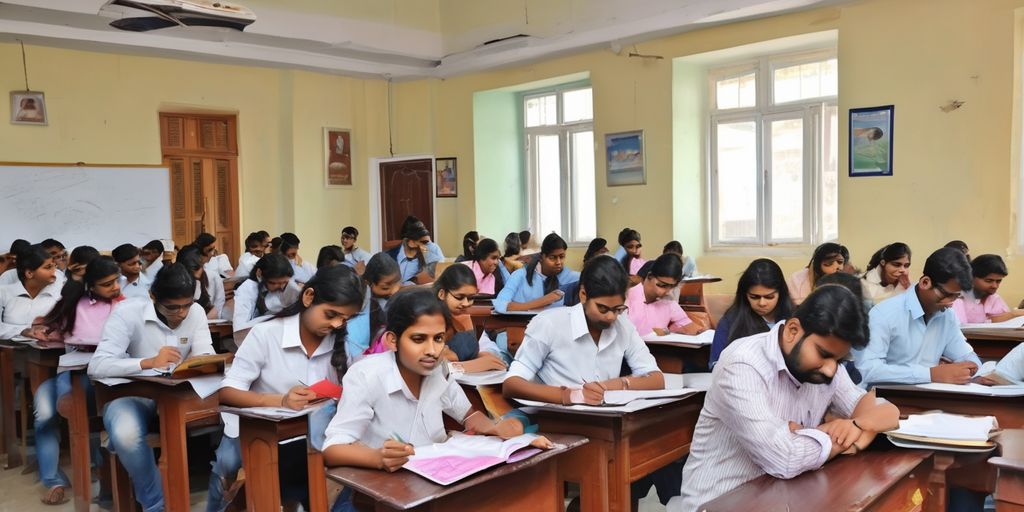Preparing for the Common Law Admission Test (CLAT) can be a challenging journey. Many students make mistakes that could easily be avoided with a bit of guidance. This article highlights some common pitfalls to watch out for during your CLAT preparation.
Key Takeaways
- Always manage your time well by practicing with a timer and setting goals for each study session.
- Get familiar with the CLAT syllabus and exam pattern to avoid surprises on test day.
- Regularly practice and revise to keep your knowledge fresh and identify weak areas.
- Take care of your physical and mental health to stay focused and perform your best.
- Make use of various study resources, including online materials and mock tests.
Neglecting the Importance of Time Management
Effective time management is crucial for mastering CLAT 2025. Many students underestimate the time needed for each section, leading to incomplete answers and lower scores. It’s essential to allocate sufficient time to each part of the exam to ensure all questions are addressed adequately.
Failing to practice with timed mock tests can be a significant setback. Mock tests help simulate the actual exam environment, allowing students to gauge their speed and accuracy. Regular practice under timed conditions can improve performance and build confidence.
Ignoring the time allotted for reviewing answers is another common mistake. Reviewing answers can help catch and correct errors, potentially improving the overall score. Prioritizing time for review is as important as answering the questions themselves.
Effective time management, school studies integration, and psychological well-being are key for success. Prioritize, practice under timed conditions, and seek support.
Overlooking the Syllabus and Exam Pattern
Understanding the syllabus and exam pattern is crucial for effective CLAT preparation. Neglecting this aspect can lead to wasted time and effort on irrelevant topics, ultimately affecting your performance.
Not Familiarizing with the Detailed Syllabus
A detailed syllabus provides a roadmap for your study plan. Without it, you might miss out on important topics that carry significant weight in the exam. Make sure to review the syllabus regularly to stay on track.
Ignoring Changes in the Exam Pattern
The CLAT exam pattern can change, and staying updated is essential. Ignoring these changes can result in unpreparedness for new question formats or sections. Always check for the latest updates from reliable sources.
Skipping Less Frequent Topics
While some topics appear less frequently, they are still part of the syllabus and can make a difference in your score. Don’t skip these topics; instead, allocate some time to cover them as well.
Inadequate Practice and Revision
Effective preparation for the CLAT exam requires consistent practice and thorough revision. Neglecting these aspects can lead to underperformance on the exam day. Here are some common mistakes to avoid:
Not Solving Previous Years’ Papers
Solving past papers is crucial for understanding the exam pattern and the types of questions asked. It helps in identifying important topics and areas that need more focus. Without this practice, you might find yourself unprepared for the actual exam.
Skipping Regular Revision Sessions
Revision is often underestimated by CLAT aspirants. Once you have covered the syllabus, revisiting the topics regularly is essential to retain information. Not revising can lead to forgetting crucial concepts, especially in subjects like legal reasoning and current affairs. Create a revision schedule and stick to it to ensure you have a strong grasp of all subjects.
Neglecting Weak Areas
It’s common for students to focus on their strengths and ignore their weak areas. However, this can be detrimental in a competitive exam like CLAT. Identify your weak subjects and allocate extra time to improve them. This balanced approach will help you score better overall.
Ignoring Health and Well-being
A healthy mind and body are essential for effective CLAT preparation. Neglecting your health by skipping meals, not getting enough sleep, or avoiding exercise can lead to decreased concentration and overall productivity. Make sure to maintain a healthy lifestyle, eat nutritious food, get adequate sleep, and engage in regular physical activity to stay mentally and physically fit during your preparation.
Mismanagement of Study Resources
Using Outdated Study Materials
Relying on old or outdated study materials can be a significant setback in your CLAT preparation. The exam pattern and syllabus often undergo changes, and using obsolete resources might leave you unprepared for the current format. Always ensure your study materials are up-to-date to reflect the latest exam trends and topics.
Relying Solely on Coaching Institutes
While coaching institutes can provide valuable guidance, depending entirely on them can be a mistake. It’s essential to supplement coaching with self-study and other resources. This balanced approach helps in developing a deeper understanding of concepts and enhances your ability to tackle different types of questions.
Not Utilizing Online Resources Effectively
In today’s digital age, there are numerous online resources available that can aid in your CLAT preparation. From mock tests to video lectures, these resources can provide additional support and practice. Make sure to utilize online resources effectively to cover all aspects of the syllabus and stay updated with any changes.
Underestimating the Importance of Mock Tests
Mock tests are a crucial part of CLAT preparation, yet many students overlook their significance. These tests are not just practice exams; they are essential for understanding the exam pattern, improving time management, and identifying strengths and weaknesses.
Not Analyzing Mock Test Results
One common mistake is not analyzing the results of mock tests. Simply taking the test is not enough; you need to understand where you went wrong and how you can improve. Mastering the art of analyzing mock tests can significantly boost your performance.
Skipping Full-Length Mock Tests
Another error is skipping full-length mock tests. These tests simulate the actual exam environment and help you get used to the pressure and time constraints. Regular practice with full-length tests is vital for building stamina and confidence.
Ignoring Sectional Mock Tests
Lastly, ignoring sectional mock tests can be detrimental. These tests focus on individual sections, allowing you to hone specific skills. They are particularly useful for identifying and improving weak areas.
Mock tests are a strategic tool for CLAT success. They help in error correction and progress tracking, making them indispensable for serious aspirants.
Neglecting the Importance of Legal Reasoning and Current Affairs
Neglecting the legal reasoning and current affairs sections in CLAT preparation can significantly impact your overall score. These sections are crucial as they test your understanding of legal principles and your awareness of current events, both of which are essential for a career in law.
Many students overlook the importance of legal reasoning and staying updated with current affairs, which are crucial for excelling in law entrance exams. Don’t make this mistake! Visit our website to explore our comprehensive courses designed to help you master these essential skills.
Conclusion
In conclusion, preparing for the CLAT exam can be a challenging journey, but avoiding common mistakes can make it much smoother. By staying organized, practicing regularly, and keeping up with current affairs, you can improve your chances of success. Remember, it’s important to read instructions carefully and manage your time well during the exam. With dedication and the right strategies, you can achieve your goal of getting into a top law school. Good luck!
Frequently Asked Questions
When does the online enrollment for CLAT 2024 start and end?
The online enrollment for CLAT 2024 starts on July 1, 2023, and ends on November 3, 2023. Make sure to submit your application before the deadline.
How do I register for CLAT 2024?
To register for CLAT 2024, visit the official CLAT website, use your personal mobile number and email ID, and follow the instructions. An OTP will be sent to your mobile for validation.
Can I change my program or category after submitting the CLAT application?
No, once the application is submitted and paid for, you cannot change the program, category, or BPL field. Make sure to fill out the form carefully.
What should I do if I find errors in my CLAT application form after submission?
Unfortunately, updates to the application form are not allowed after submission. Ensure all information is accurate before submitting the form.
Are there any health tips for CLAT preparation?
Yes, don’t ignore your physical and mental well-being. Regular exercise, a balanced diet, and adequate sleep are crucial for effective preparation.
Why is it important to practice with timed mock tests for CLAT?
Timed mock tests help you manage your time effectively during the actual exam. They also give you a feel of the exam pattern and help you identify your weak areas.









